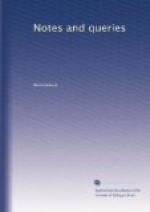“For often he that will begyle,
Is gyled with the same gyle,
And thus the gyler is begyled.”
We most probably had the word from the old French Guiller=tromper, and the proverb is to the purpose:—
“Qui croit de Guiller Guillot, Guillot le Guile.”
Horne Tooke’s fanciful etymology cannot be sustained. MR. HICKSON’S explanation of “guiled shore,” is, however, countenanced by the following passage in Tarquin and Lucrece:—
“To me came Tarquin armed, so beguil’d
With outward honesty, but yet defil’d
With inward vice.”
MR. HICKSON has, I think, conferred a singular favour in calling attention to these perplexing passages in our great poet and these remarks, like his own, are merely intended as hints which may serve to elicit the true interpretation.
S.W. SINGER.
Mickleham, August 20. 1850.
* * * * *
FAMILY OF LOVE.
I do not know whether the following Notes on “The Family of Love” will be deserving a place in the pages of “NOTES AND QUERIES;” as I may possibly have been anticipated in much of what I send.
The Family of Love attracted notice as early as 1575, but not in such a manner as to call for direct coercion. An apology was published for them, from which it might be inferred that they possessed no distinct opinions, but merely bound themselves to a more exalted interpretation of Christian duties, on the principle of imitating the great love of God manifested in their creation and retention. This principle, unrestrained by any confession of faith or system of discipline, naturally attracted to it the loose and irregular spirits that were at that time so prevalent, and the sect became the receptacle for every variety of opinion and disorder, exposing itself to more particular notice from its contempt for outward observances, and its opposition to the civil government. The Evangelium Regni of Henry Nicholas, the acknowledged founder of the sect, is written in such a manner as to include all religious persuasions, and permits all parties to hold whatever sentiments they please, if they merely declare themselves members of the Family of Love.
“Omnes vos, O amatores veritatis! qui amabilem vitam charitatis diligitis vocatmini et invitamini.” (cap. 41.) ... “Omnes peribunt, qui extra Christum extra communionem charitatis manent.” (Ibid.)
A confutation of this sect was written in the year 1579; the privy council called upon the convocation of the year 1580 to notice it. We find the sect still described in the publications of 1641, and continuing under the same name with its preachers and congregations in 1645.
Bp. Cooper, in speaking of the sect in 1589 (Admonition, &c., p. 146.), terms them “that peevish faction of the ‘Familie of Love,’ which have been breeding in this realm the space of these thirty years.”




